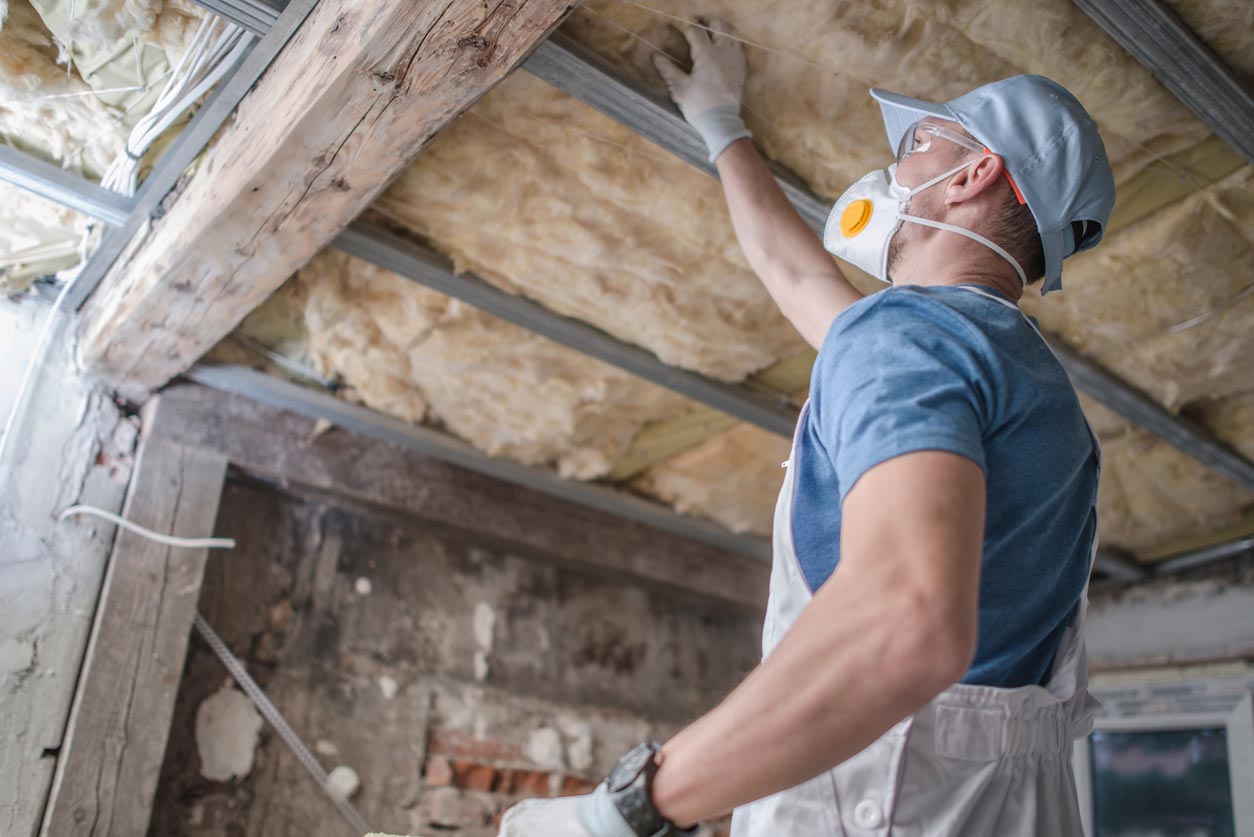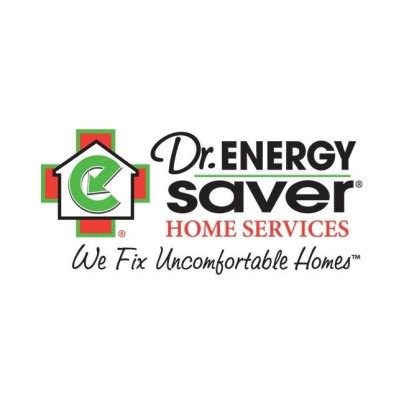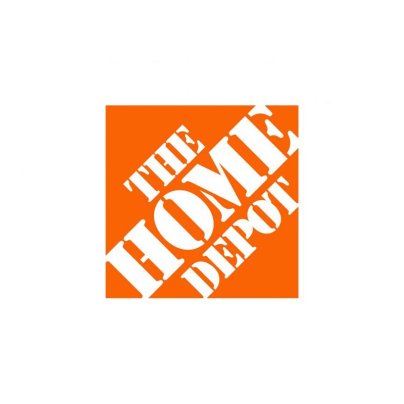
We may earn revenue from the products available on this page and participate in affiliate programs. Learn More ›
A home’s heating and cooling systems do a great job of making spaces comfortable. However, some homes aren’t as good at retaining that comfortable air. Poorly insulated walls, ceilings, windows, and doors can allow drafts to penetrate the home, warm air to escape during the winter, and cool air to escape during the summer.
Luckily, a quality insulation job can solve those issues—all a homeowner has to do is call the right company for the job. This guide on the best insulation contractors will explain how to find the right company and highlight some of our top choices.
- BEST OVERALL: Dr. Energy Saver
- BEST AGGREGATOR: Angi
- ALSO CONSIDER: The Home Depot

What to Consider When Choosing One of the Best Insulation Contractors
There is quite a bit more to hiring an insulation contractor than performing an internet search for “insulation experts near me” or “spray insulation contractors near me” and going with the first name that pops up. The following sections include some of the essential factors that homeowners will want to consider when comparing insulation companies.
Service Area and Scheduling
Insulation contractors often work within specific service areas, so it’s important to start the search there. Even large national chains may limit the areas they serve. Homeowners will want to look for home insulation services that serve the project’s area.
Next, it’s wise to consider how the contractor handles consultations and scheduling. Before a contractor can provide an accurate quote, they’ll need to set up an appointment to assess the home’s current insulation. Some companies may allow customers to schedule appointments through an online portal; however, many may require a phone call to set up an appointment.
Once the appointment is in the books, the insulation installer will send a representative to the home to check the current insulation. They’ll look in the attic and basement or crawl space. They’ll also perform draft checks around windows or even set up a draft machine designed to create a draft to see where the leaks are. Once the inspection is complete, they’ll put together a customized audit of the home’s efficiency and a plan to solve the home’s insulation problems.
Types of Insulation
There are several types of insulation, and many companies will install multiple types to meet each home’s individual needs. The following are some of the most common insulation types.
Batts: This type of insulation is made up of spun glass fibers, mineral rock, and other materials. It comes in rolls and fits between joists or studs.
- Blown-in: Blown-in insulation is typically cellulose, which is a loose material made from recycled paper products and treated with a fire-resistant chemical. Blown-in insulation companies typically fill a hopper that pumps this loose fill through a hose, allowing them to blow it between the joists in the attics or into wall cavities.
- Spray foam: Spray foam insulation is typically a polyurethane-based material that the user can spray into the joist and stud bays. This material sticks to the wood and begins to expand, filling the gaps and creating both a vapor barrier and a thermal barrier. There are two types:
- Open-cell foam: When open-cell foam expands and hardens, its cells do not fully close. This makes open-cell foam less expensive, but it doesn’t insulate as well, and it’s not quite as water- or vapor-resistant.
- Closed-cell foam: Opposite of open-cell foam, closed-cell foam dries with tiny air pockets sealed off inside. These closed cells make this foam an excellent insulator and much better at resisting vapors.
- Rigid foam: Rigid foam insulation made from polystyrene comes in large sheets or strips. It can adhere to basement and foundation walls to provide more insulation for concrete surfaces.
- Radiant barriers: Radiant barriers are shiny, metallic layers that reflect heat back toward the source. They’ll resist the sun’s heat in the summer while improving the home’s heat during the winter.
Areas of the Home Treated
While walls, windows, doors, and ceilings may all be guilty of energy loss, not all companies handle these areas the same. For instance, some companies may only insulate attic floors, while others may insulate everything from foundation walls to roof rafters. Homeowners will want to identify their specific needs so they know what to look for from home insulation companies.
Also, customers need to understand that the insulated area may be a factor in the project’s overall cost. Insulating the attic floor is generally fairly affordable, while spraying closed-cell foam in a crawl space under the home will cost more.
Licensing and Insurance
It’s important to go with a credible and reliable insulation contractor. One way to ensure that the contractor is legitimate is to ask to see their business license. They’ll have to obtain this license from the state, and this can give the homeowner assurance that the business is legitimate.
Also, homeowners will want to be sure that any contractor in consideration is insured. Contractors should carry general liability at a minimum. This insurance protects both the homeowner and the contractor in the event of an accident that causes injury or property damage. It may also provide protection to any third parties (like the neighbor) whose property may receive some accidental damage at the hands of the insulation contractor.
Our Top Picks
That’s a lot of background on choosing the best insulation contractor, but the task might still seem overwhelming. Folks who’d prefer just a bit more help can check out the following list, which includes some of the best insulation contractors. Most homeowners will find an option below to fit their needs.
Best Overall
Dr. Energy Saver
Pros
- Whole-home insulation services available
- Comprehensive whole-home energy audits
- Spray foam, blown-in, and rigid foam insulation installation offered
- Home HVAC installation and repair services available
Cons
- Emergency services, scheduling, and customer support options vary by location
- Service area: 25 states
- Scheduling: Varies by location
- Types of insulation: Spray foam, blown-in, rigid foam
- Areas of the home treated: All
Why It Made the Cut: Serving 25 states and providing a wide variety of insulation types, Dr. Energy Saver provides whole-home audit and insulation services, making it a contractor worth considering. Folks looking for a full-service insulation contractor that offers a wide variety of insulation services will want to consider Dr. Energy Saver. This insulation contractor offers services in 25 states, performing comprehensive whole-home audits for its customers. Dr. Energy Saver comprises a network of private contractors, meaning emergency services, scheduling, and customer support will vary based on the business. Dr. Energy Saver handles whole-home insulation projects, including attics, basements, walls, crawl spaces, and more. Insulation types include spray foam, blown-in, and rigid foam insulation, allowing homeowners to work with Dr. Energy Saver to find a solution for their homes. Dr. Energy Saver can also help homeowners with their HVAC installation and repairs, as well as windows, doors, heating, and water heater needs.
Best Aggregator
Angi
Pros
- Customers can filter by project and choose from local professionals
- Customers can obtain quotes or bids within minutes
- Streamlined and user-friendly website Comprehensive resource center organized by project type
Cons
- Name, phone number, and email are required to browse local services
- Persistent follow-up emails
- Service area: 50 states and Washington, D.C.
- Scheduling: Online
- Types of insulation: Varies by provider
- Areas of the home treated: Varies by provider
Why It Made the Cut: Angi connects homeowners with its trusted network of contractors, helping them find a company to solve their insulation challenges. Offering nationwide reach to a network of trusted professionals, Angi is the aggregator of choice for most folks looking for insulation contractors. Homeowners input project information, along with their name, address, and email, and Angi will distribute that information to trusted contractors in their area, allowing shoppers to get several quotes for the job. Although the persistent follow-up emails can become annoying for homeowners (a problem easily solved by diverting them to a spam folder) Angi is easy to use. The website is streamlined and user-friendly, and folks shopping for insulation contractors can filter the results by project type and obtain quotes and bids within minutes. And for those who’d like to know a little more about the project before contractors start calling, Angi has a resource center of blog posts and articles organized by project type.
Also Consider
The Home Depot
Pros
- Spray radiant barrier and foil radiant barrier installation offered
- Consultation scheduling available online and by phone
Cons
- Insulation services only available for attics
- Service area: 50 states and Washington, D.C.
- Scheduling: Online, phone
- Types of insulation: Blown-in, spray radiant barrier, foil radiant barrier
- Areas of the home treated: Attic
Why It Made the Cut: The Home Depot provides attic insulation solutions in all 50 states and Washington, D.C., with flexible scheduling and a range of materials to choose from. If it’s just the attic that needs insulating, customers will want to give The Home Depot some consideration. This big-box store offers insulation contracting services, connecting the homeowner with one of the company’s trusted contractors to provide attic insulation services in 50 states and Washington, D.C. After an in-home consultation, the customer receives an assessment of their current insulation, recommendations, and a free quote. While The Home Depot only offers attic insulation, the choices of materials are a bit more varied. Shoppers can choose from insulation products such as blown-in, spray radiant barriers, and foil radiant barriers. The Home Depot can even help set up financing to help homeowners avoid paying for their insulation all at once.
Our Verdict
Folks looking for an all-around capable professional that can handle insulation, doors, windows, and even HVAC will want to consider Dr. Energy Saver. However, those who’d like to get a few quotes before they move forward may want to give Angi some thought.
How We Chose the Best Insulation Contractors
Choosing a list of the best insulation contractors wasn’t a breeze by any means. We had to draw upon our experience with home improvement and insulation products to pick out the features and offerings we felt would matter most to homeowners. Once we knew what to look for, we extensively researched companies in the field. We assessed them for their availability, offerings, and materials. Companies that didn’t offer enough value were tossed aside, while those that passed earned a spot on this list.
Before You Hire One of the Best Insulation Contractors
The prospect of saving money on the energy bill each month is pretty exciting, but there are a few things shoppers should know before hiring one of the best insulation contractors.
For example, there is a double-edged sword to some spray-in insulation products. Many of the chemicals (HFC-245fa, HFC-365mfc, and HCFC-141b) used in spray foam have very high GWP (Global Warming Potential) ratings. So despite using fewer fossil fuels to keep the home warm and comfortable, these chemicals could harm the environment. Other types of insulation may be more environmentally friendly than spray foam.
Also, customers will want to note that before an insulation contractor starts, the contractor must first seal the home by eliminating any cracks or gaps that air can get through. This ensures that the homeowner’s money goes as far as possible. However, proper ventilation should be allowed where necessary, such as in the eaves of an attic, to allow for proper airflow.
Cost of Hiring One of the Best Insulation Contractors
The cost of insulation in a home is around $2,900, with an average range between $1,400 and $6,300. Many factors go into those prices, so it’s necessary to take a closer look.
One of the main determining factors is the size of the space that requires insulation. Since insulation is often sold by the board foot (1 foot by 1 foot by 1 inch), the more board feet necessary, the more expensive the job.
Also, the material used is a significant variable. Fiberglass is very inexpensive, placing it toward the bottom of the price range. However, spray-in insulation can be expensive, running on the higher end of the price range.
It’s also necessary to look at the area being insulated. Attics and basements are typically wide open, making insulation a breeze. However, crawl spaces, knee walls, and other difficult-to-reach spaces will be tougher to get to and will cost significantly more.
The Advantages of Using One of the Best Insulation Contractors
Insulating spaces that have never been insulated properly before can do a lot for the home. Not only will this improvement lower the energy bill, but it will also make the home more comfortable to live in, with fewer drafts and mechanical equipment running less often.
Hiring the job out to a contractor may be a good idea. Many insulation products are extremely itchy, while others are incredibly messy. Also, professional roof insulation installers will know which gaps to seal and which to leave alone, allowing for proper insulation and ventilation within a space like an attic or upper floor.
Insulation contractors have tools and equipment designed to find leaks and drafts, allowing them to develop a plan for the home. While a homeowner may be able to install their own insulation, the comprehensive report that an insulation contractor can provide may be worth the extra cost.
- Insulating the home lowers the energy bill and makes the home more comfortable.
- Pros know how to seal properly, providing insulation without cutting off important ventilation.
- The tools and comprehensive report that an insulation contractor can provide can be worth the extra expense.
FAQs
Even with all that information on the best insulation contractors, there may still be some questions floating around. To help, we put together the following list of frequently asked questions about insulation contractors.
Q. How do you estimate insulation costs?
Insulation volume is measured by the board foot, which is 1 square foot by 1 inch in thickness. Careful measurement of the space requiring insulation divided by a board foot will provide an estimate of the minimum amount of insulation necessary.
Q. Can you over-insulate an attic?
Yes. If an attic can’t breathe, the air inside can become hot and moist, providing the perfect conditions for mold. Attic insulation installers or ceiling insulation installers know how to handle this properly, providing enough ventilation while also cutting back on energy loss.
Q. Can you put new insulation over old?
Yes. In many cases, contractors suggest this to homeowners to save them money. New insulation can be laid or blown in over top of old.
Q. Should I insulate my walls myself?
If the drywall is removed, yes, it’s fine to insulate the walls yourself. However, if the goal is to avoid demolition, hiring a pro that can spray into the wall cavity is a good idea.
Q. What does R-value mean in insulation?
R-value determines how well a material resists heat flow. The higher the number, the thicker the insulation (usually) and the better the insulation value.
Q. Does fiberglass insulation burn?
Fiberglass does not burn. The paper backing on the back of insulation may burn, but the fibers themselves are more likely to melt than burn.






